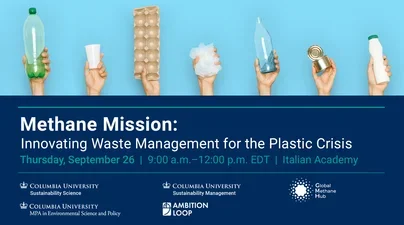Methane Mission: Innovating Waste Management for the Plastic Crisis

About this Event
Join us for an opportunity to rethink waste management—not just as a necessity, but as a powerful tool for reducing emissions, enhancing public health, and driving economic growth in emerging economies. The event is hosted by the M.S. in Sustainability Management (SUMA), M.S. in Sustainability Science (SUSC), and M.P.A. in Environmental Science and Policy (ESP) program, in collaboration with Ambition Loop.
Program
This event will explore how strategic investments in waste management can tackle the global plastic crisis, enhance community health, and create economic stability. With waste being the third largest source of methane emissions and methane being a greenhouse gas 86 times more potent than carbon dioxide over a 20-year period, there is the potential for devastating consequences if meaningful intervention is not taken. Key actions such as organic waste separation, landfill gas capture, and reducing food waste have the potential to cut methane emissions by up to 36 million metric tons annually.
Welcome Remarks by Steven A. Cohen. Dr. Cohen is a Professor in the Practice of Public Affairs at the Columbia University School of International and Public Affairs (SIPA), the Senior Vice Dean at the Columbia University School of Professional Studies (SPS), the Program Director of the M.S. in Sustainability Management program at SPS and the MPA in Environmental Science and Policy program at SIPA, and the Director of the Earth Institute’s Research Program on Sustainability Policy and Management. From 2006 to 2018, he was the Executive Director of Columbia University’s Earth Institute.
This event will be comprised of four sessions covering key focus areas:
- Session 1: Methane Reduction through Organic Waste Management: Learn how source-separated organic waste management can drastically reduce methane, a greenhouse gas far more potent than carbon dioxide in the short term.
- Session 2: Global Policy and Negotiation: Plastic Treaty Opportunities: Understand the international efforts and agreements driving sustainable waste management and methane reduction.
- Session 3: Private Sector Solutions for Waste Management: Discover innovative solutions from industry leaders that are transforming waste management into a growth sector.
- Session 4: New York City as a Case Study: Our Model and Policies: Dive into New York City’s latest waste management policies, including initiatives to separate food waste, reduce landfill reliance, and promote sustainability.
With global waste generation projected to surge by 70% by 2050, the need for sustainable solutions is urgent. This event will demonstrate how effective waste management can not only reduce emissions but also build resilience, enhance public health, and drive economic growth. Don’t miss the chance to be part of this crucial conversation and help turn waste management into a key driver of sustainability.
RECEPTION
Light refreshments will be served at this event.
This event is free and open to the public.
ADDITIONAL INFORMATION
For further information please contact Lili Csorba, lcsorba [[at]] climate [[dot]] columbia [[dot]] edu (SUMA/SUSCI).
For additional information about program offerings at Columbia University’s School of Professional Studies, please contact an Admissions Counselor at 212-854-9666 or inquire [[at]] sps [[dot]] columbia [[dot]] edu .
Columbia University makes every effort to accommodate individuals with disabilities. Please notify the office at least 10 days in advance if you require closed captioning, sign-language interpretation or any other disability accommodations. Alternatively, Disability Services can be reached at 212.854.2388 and disability [[at]] columbia [[dot]] edu.
For questions about health and safety, please visit Columbia University’s Hub for Emergency Preparedness for the latest policies, as they are subject to change.